Medication Dry Mouth Risk Calculator
If you’ve ever woken up with a cottony, sticky feeling in your mouth-like you’ve been breathing through your nose all night-chances are you’re not alone. And if you’re taking any kind of regular medication, that dry mouth isn’t just annoying. It’s a direct side effect, and it’s more common than most people realize. About 11 million Americans experience dry mouth because of their prescriptions. For older adults, it’s even worse: nearly 8 out of 10 cases happen in people over 65. Yet, most doctors never mention it. And when they do, they often treat it like a minor inconvenience instead of a serious health risk.
Why Your Medications Are Drying Out Your Mouth
Your saliva isn’t just there to help you swallow food. It’s your mouth’s natural defense system. It washes away food particles, neutralizes acids, fights bacteria, and keeps your teeth from decaying. When your salivary glands stop working properly, everything changes. The problem starts with how your body makes saliva. It’s controlled by your autonomic nervous system, specifically through signals that use a chemical called acetylcholine. Many medications block this signal-especially those with anticholinergic properties. These drugs are designed to calm overactive systems: think bladder spasms, allergies, depression, or even motion sickness. But they don’t know the difference between the bladder and the salivary glands. So when they shut down one, they shut down the other too. About 68% of medications that cause dry mouth work this way. That includes common drugs like oxybutynin (for overactive bladder), diphenhydramine (Benadryl), and amitriptyline (a tricyclic antidepressant). In some cases, these drugs can reduce saliva production by up to 85%. And it’s not just one drug. If you’re taking three or more prescriptions, your risk of dry mouth jumps by more than double. People on five or more medications have an 18% chance of nearly complete saliva shutdown.Which Medications Are the Worst Offenders?
Not all drugs are created equal when it comes to drying out your mouth. Some are far more likely to cause trouble than others.- Bladder medications: Oxybutynin (Detrol) causes dry mouth in over 70% of users. Tolterodine (Detrol) is close behind at 62%. Even newer versions like solifenacin (Vesicare) still hit nearly half of users.
- Antihistamines: First-generation ones like diphenhydramine (Benadryl) cause dry mouth in 58% of people. But second-generation options like loratadine (Claritin) only affect about 12%.
- Antidepressants: Tricyclics like amitriptyline trigger dry mouth in 63% of patients. SSRIs like sertraline are better, but still cause it in 31%.
- Antipsychotics: Haloperidol causes dry mouth in 54% of users. Aripiprazole, a newer option, is gentler at 37%.
Why Dry Mouth Is More Than Just Discomfort
You might think, “It’s just a dry mouth. I’ll drink more water.” But that’s not enough. Saliva doesn’t just make talking and eating easier. It’s your mouth’s first line of defense against decay and infection. Without enough saliva, plaque builds up faster. Bacteria multiply. Acid doesn’t get washed away. And your teeth start breaking down-fast. People with untreated dry mouth see a 300% increase in cavities within just 12 months. That’s not a typo. In one study, patients on three or more medications had a 47% higher rate of root decay than those on fewer drugs. Root decay is especially dangerous because it’s harder to treat and often leads to tooth loss. Dry mouth also makes it harder to swallow pills, taste food, and speak clearly. Many people report waking up at night because their mouth is so parched. Others avoid social meals because eating becomes painful. It affects sleep, nutrition, and mental health. And because it’s so common in older adults, it’s often mistaken for normal aging-when it’s actually preventable.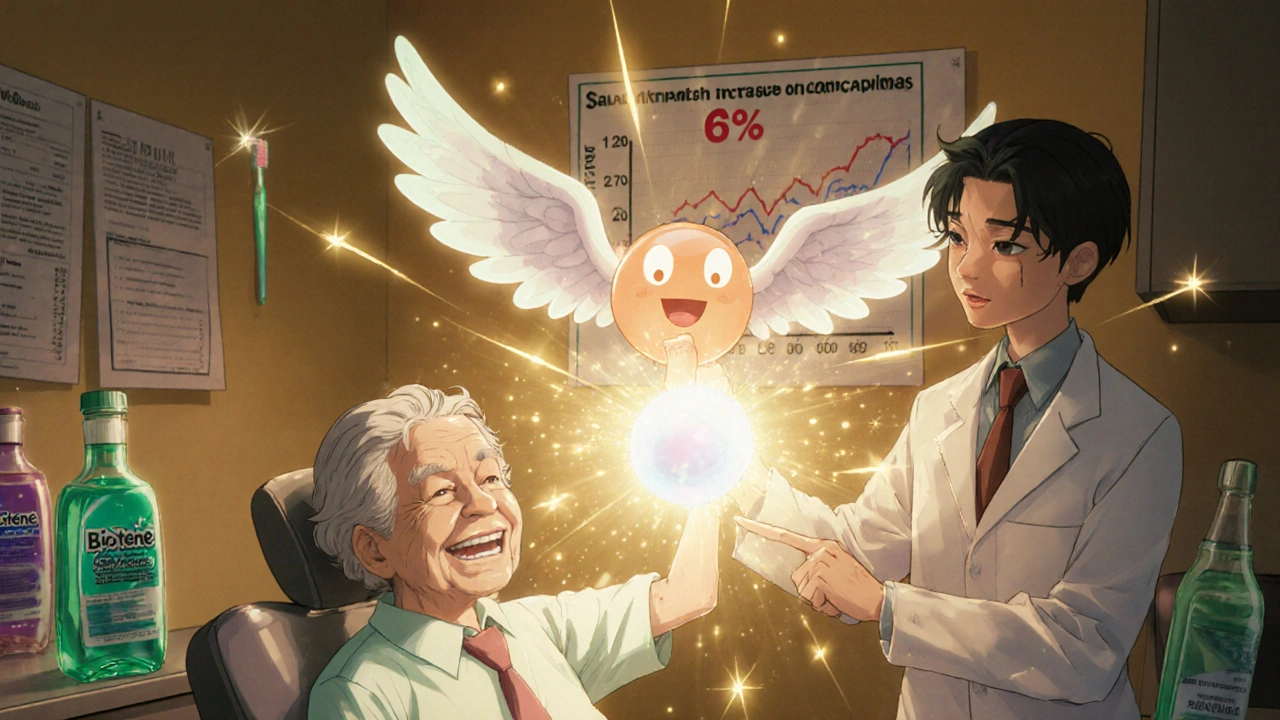
How to Manage Dry Mouth When You Can’t Stop Your Meds
You can’t always quit your medication. But you can manage the damage. Here’s what actually works, backed by clinical guidelines and patient outcomes.- Review your meds with your doctor. Ask: “Is there a non-drying alternative?” In 42% of cases, switching to a different drug in the same class reduces dry mouth without losing effectiveness. For example, switching from diphenhydramine to loratadine cuts the risk from 58% to 12%.
- Use a prescription stimulant. Pilocarpine (Salagen) and cevimeline (Evoxac) are FDA-approved drugs that actually trigger your salivary glands to produce more saliva. In trials, pilocarpine increased saliva flow by 63% in just two weeks. Cevimeline, approved in April 2023, showed 72% improvement in patients with medication-induced dry mouth.
- Use a therapeutic oral rinse. Regular mouthwash won’t help-it often has alcohol, which dries you out more. Instead, use products like Biotene Dry Mouth Oral Rinse or ACT Dry Mouth Relief. These contain enzymes that mimic saliva and provide relief for up to 7 hours. In clinical testing, 81% of users reported lasting comfort after use.
- Hydrate smartly. Sip water throughout the day. Keep a bottle by your bed. Avoid caffeine and alcohol-they’re diuretics and make dryness worse. Sugar-free gum with xylitol can help stimulate saliva, too.
- See your dentist every 3 months. Standard six-month cleanings aren’t enough. If you’re on multiple medications, you need to catch decay early. Dentists can apply fluoride varnish, recommend special toothpaste, and monitor for signs of root decay.
The Hidden Problem: Doctors Don’t Talk About It
Here’s the biggest barrier: most doctors don’t ask about dry mouth. A 2023 survey found that only 28% of primary care physicians routinely check for it during medication reviews. Patients report that 67% of their doctors never mentioned dry mouth as a possible side effect-even when prescribing high-risk drugs. Dentists are catching up. Eighty-nine percent now ask about medications during intake. But only 52% feel confident managing it. That’s why coordinated care matters. When your dentist and doctor talk-when your pharmacist flags a high-risk combo-you get better outcomes. One 2023 study showed that patients in integrated care programs had 57% fewer dental complications.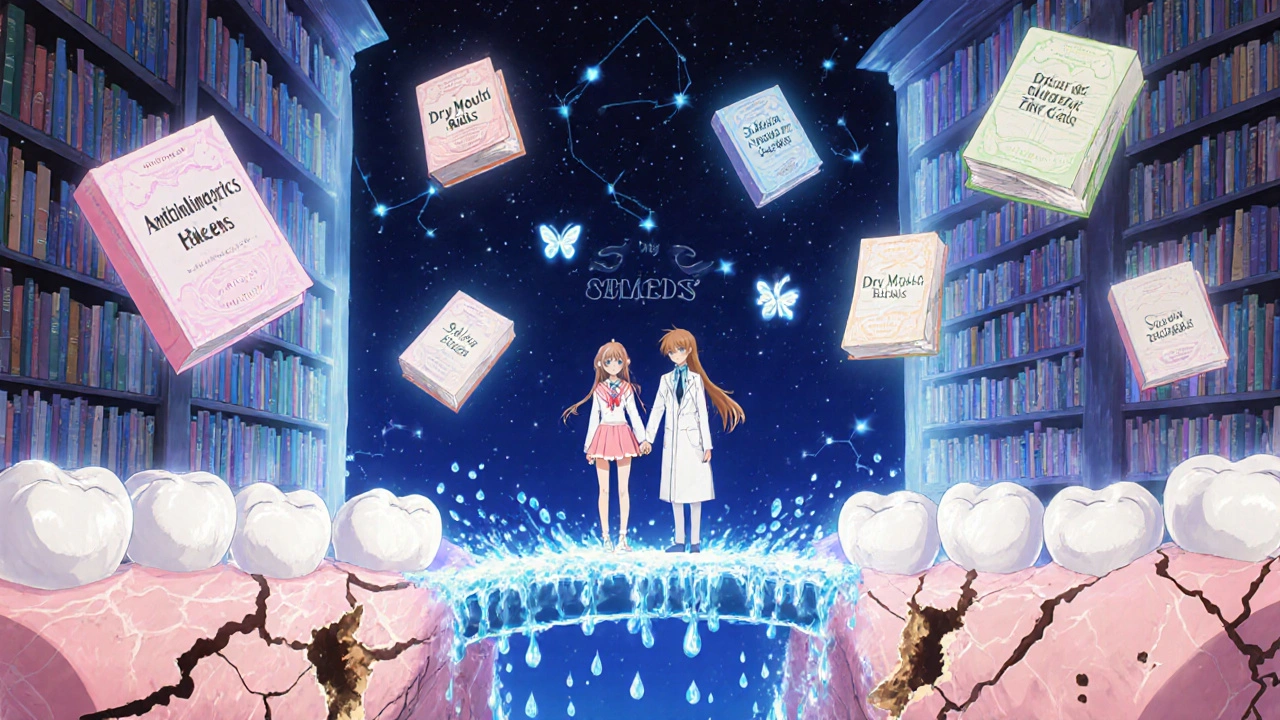
What’s Changing? New Hope on the Horizon
The tide is turning. In January 2024, the NIH launched a $15.7 million research project focused on finding non-anticholinergic alternatives for bladder medications-the biggest offender. Companies are innovating too. Biotene’s new Enzyme-Activated Moisturizing System, released in August 2023, extends relief from 4 to 7 hours. The American Dental Association predicts that by 2027, all new medications will be required to include dry mouth risk assessments on their labels. That’s a big step. Right now, only 31% of people with medication-induced dry mouth get proper care. By 2028, that number could jump to 68% if integrated care models keep expanding.What You Can Do Today
If you’re on meds and your mouth feels like sandpaper:- Write down every medication you take-prescription, over-the-counter, even supplements.
- Ask your doctor: “Could any of these be causing dry mouth? Is there a gentler option?”
- Ask your dentist: “Am I at risk for dry mouth-related decay? Should I come in every 3 months?”
- Keep a bottle of sugar-free saliva substitute by your bed and at your desk.
- Don’t wait until you have a cavity. Dry mouth accelerates decay. Early action saves teeth.
Can dry mouth from medication lead to tooth loss?
Yes. Without saliva to neutralize acids and wash away bacteria, plaque builds up quickly, leading to rapid tooth decay-especially at the gum line (root decay). Studies show people with untreated dry mouth can lose teeth up to three times faster than those with normal saliva flow. In older adults on multiple medications, this is one of the leading causes of preventable tooth loss.
Is drinking more water enough to fix dry mouth from meds?
No. While staying hydrated helps, drinking water doesn’t replace saliva. Saliva contains enzymes, proteins, and minerals that protect your teeth and fight bacteria. Water just moistens your mouth temporarily. Without actual saliva production, your teeth remain vulnerable to decay. You need products that mimic or stimulate saliva, not just hydration.
What over-the-counter products actually work for dry mouth?
Look for alcohol-free products labeled for dry mouth. Biotene Oral Rinse, ACT Dry Mouth Relief, and xylitol-containing gums or mints are proven to help. Avoid mouthwashes with alcohol or sodium lauryl sulfate-they dry out your mouth further. Products with enzymes that mimic saliva (like lactoperoxidase) are more effective than plain moisturizers.
Can I switch my medication to avoid dry mouth?
Sometimes. For example, switching from diphenhydramine to loratadine cuts dry mouth risk from 58% to 12%. For bladder meds, solifenacin causes less dryness than oxybutynin. For depression, SSRIs like sertraline are better than tricyclics. But never stop or switch meds without talking to your doctor. The goal is to find an alternative that works for your condition without the side effect.
Why do dentists now recommend 3-month checkups for people on dry-mouth meds?
Because decay moves fast. In people with dry mouth, cavities can form in as little as 3-4 months instead of the usual 6-12. A 3-month checkup lets your dentist catch early decay, apply protective fluoride, and adjust your care plan before you need fillings or root canals. Delaying care increases the risk of tooth loss and costly procedures.
Are prescription saliva stimulants safe?
Yes, when used as directed. Pilocarpine and cevimeline are FDA-approved and have been used safely for decades. Side effects can include sweating, nausea, or frequent urination-but these usually fade after a few weeks. They’re not for everyone (especially those with asthma or glaucoma), so your doctor will screen you first. But for many, they’re life-changing: they restore natural saliva and protect teeth long-term.



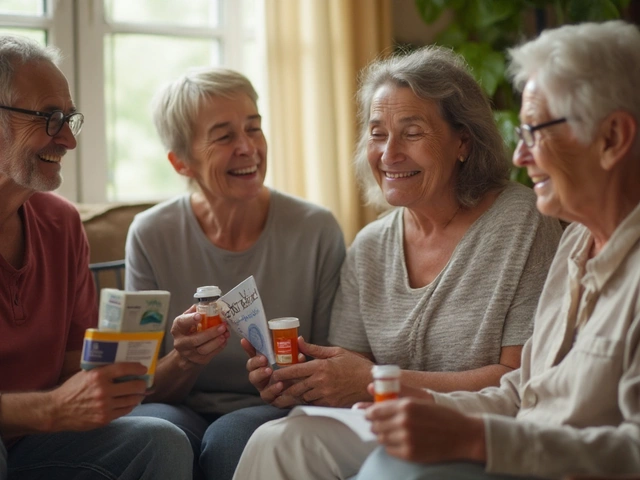
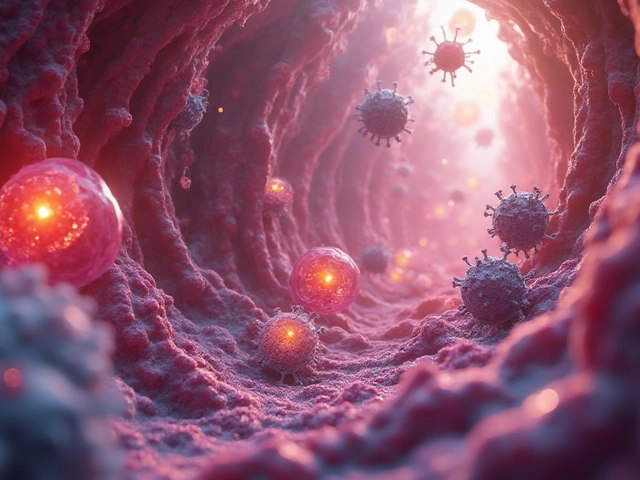

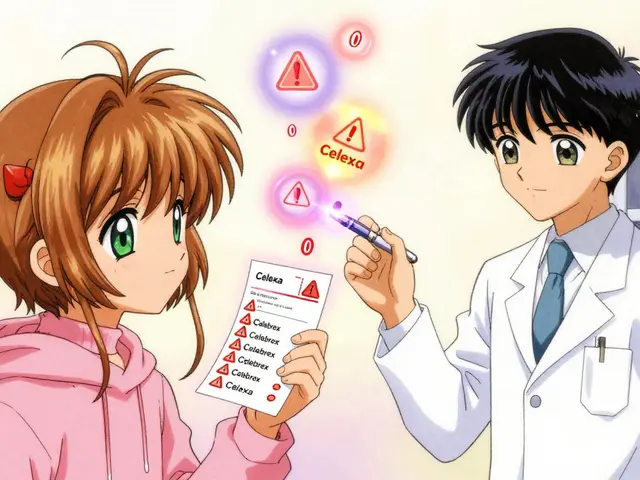
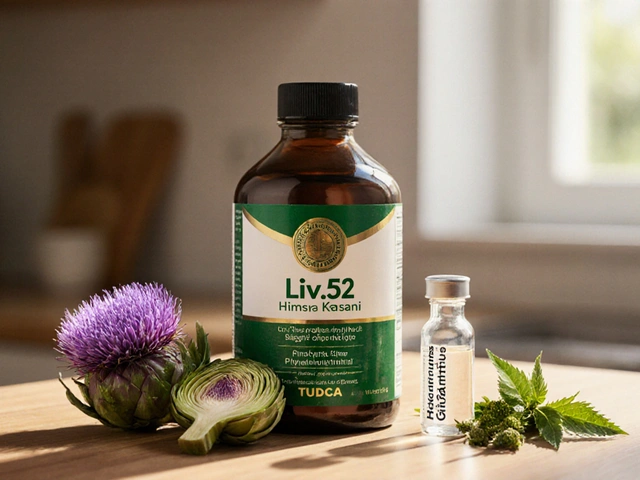
12 Comments
Shannon Amos
November 25, 2025 AT 22:50So let me get this straight - we’re telling people to drink more water like it’s a magic potion, but the real problem is our meds are basically turning their mouths into the Sahara? And no one’s telling them until their teeth are already asking for a funeral? 😑
stephen riyo
November 27, 2025 AT 05:20Wait... wait... I just took Benadryl last night for allergies... and I woke up feeling like I’d been chewing on sandpaper... and now you’re telling me this is a known side effect... and my doctor never mentioned it... and I’ve been doing this for years... and now my dentist is like, ‘You’ve got decay here, here, and here’... I feel violated... like, why didn’t anyone say anything?!
Wendy Edwards
November 28, 2025 AT 00:07OMG YES. I’ve been on amitriptyline for migraines and my mouth has felt like a desert for 3 years. I thought it was just ‘getting old.’ My dentist finally called me out on it last month - ‘Girl, you’re losing teeth like confetti.’ I switched to sertraline and my mouth feels like it’s been baptized. Also, Biotene rinse? Lifesaver. Buy it. Love it. Tell your grandma. She needs it too. 💕
Jaspreet Kaur
November 28, 2025 AT 22:47Saliva is the silent guardian of our mouths... we don't notice it until it's gone... and then we realize how much we depended on something we never thought about... the body is a symphony... and when one instrument stops... the whole piece collapses... maybe we need to stop treating symptoms and start listening to what our bodies are trying to tell us...
Albert Guasch
November 30, 2025 AT 05:43It is imperative to underscore that the prevalence of xerostomia secondary to polypharmacy constitutes a significant public health concern, particularly among geriatric populations. Evidence-based interventions, including pharmacologic stimulation via pilocarpine and cevimeline, coupled with interdisciplinary dental-medical collaboration, demonstrate statistically significant reductions in caries progression and improved quality-of-life metrics. Clinicians must prioritize comprehensive medication reconciliation and patient education to mitigate this under-recognized iatrogenic condition.
Stephanie Deschenes
December 2, 2025 AT 01:14One thing people don’t talk about: dry mouth makes swallowing pills feel like choking on a cotton ball. I started using a tiny squeeze bottle of water right next to my pill organizer - game changer. Also, don’t ignore the sugar-free gum with xylitol. It’s not magic, but it’s the closest thing you’ve got between doctor visits.
Bea Rose
December 3, 2025 AT 19:15Doctors don't mention it because they don't care. Dentists know but can't fix your meds. You're on your own. Good luck.
Michael Collier
December 4, 2025 AT 09:30Thank you for this comprehensive and clinically grounded overview. The integration of medical and dental care pathways for patients on chronic polypharmacy represents a critical gap in our current healthcare delivery model. I strongly encourage all practitioners to adopt standardized screening protocols for xerostomia during routine medication reviews, as early identification remains the cornerstone of preventive intervention.
Gina Banh
December 5, 2025 AT 14:02They say ‘just drink water’ like it’s a Band-Aid on a broken leg. My mouth’s been dry for 5 years. I’ve tried everything. The only thing that actually worked? Switching from oxybutynin to solifenacin. Took 3 months to find the right doc who’d listen. Don’t let them gaslight you. Your mouth matters. And your dentist? They’re your last line of defense. Go every 3 months. Even if it hurts to pay for it.
Deirdre Wilson
December 6, 2025 AT 01:50I used to think dry mouth was just… being old. Then I tried that Biotene spray and it felt like my mouth had been hugged by a cloud. Like, I could taste my coffee again. I cried. Not because it was sad - because it was the first time in years I didn’t feel like I was chewing on a sock.
Damon Stangherlin
December 6, 2025 AT 17:06Just wanted to say I’ve been on 7 meds and my mouth felt like a desert. I started using ACT Dry Mouth rinse and it’s been a miracle. Also, I mis-spelled ‘saliva’ like 3 times in this comment and I’m not even sorry. My tongue’s still dry.
Ryan C
December 6, 2025 AT 20:44Actually, the NIH study you cited? It's not $15.7M - it's $15.7M *over 5 years*. Also, cevimeline was approved in 2023? No - it was approved in 1999. You're mixing up the new formulation with the original. And Biotene’s new system? It’s not “enzyme-activated” - it’s a buffered electrolyte system with mucin mimetics. Just saying. 😎